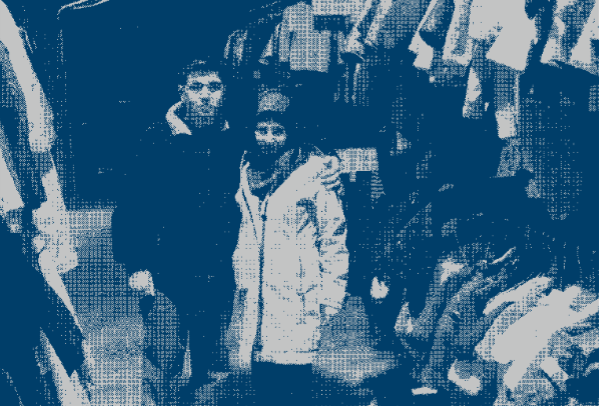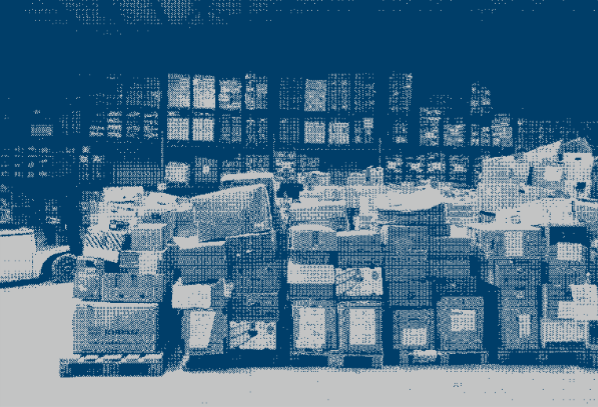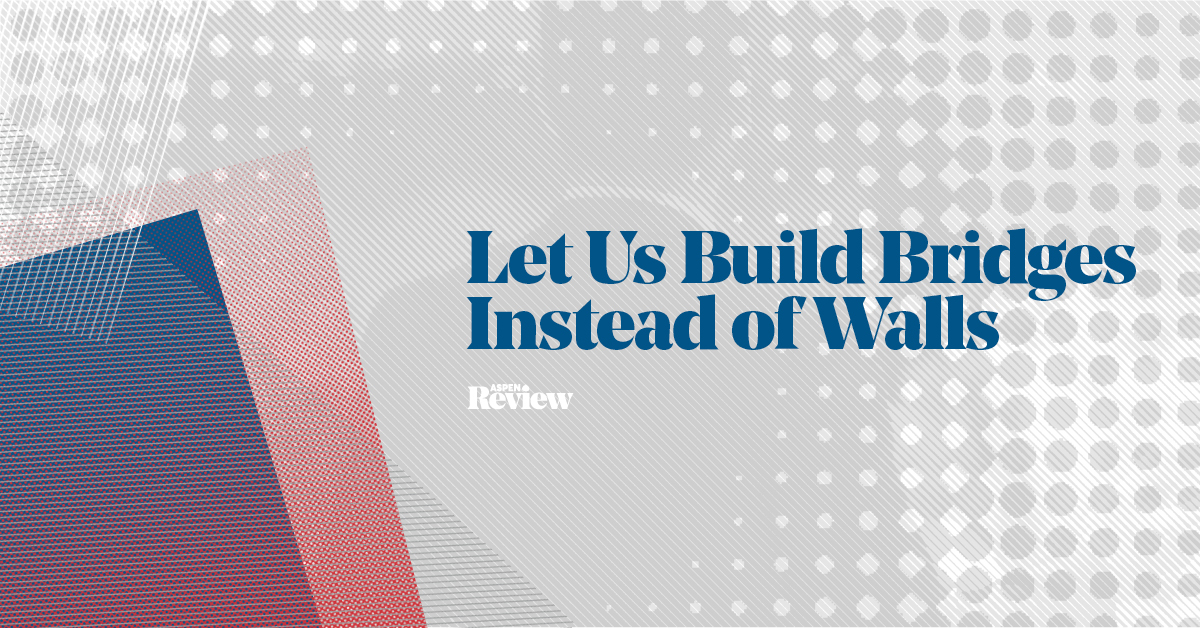We need young, capable people to pump new energy into our ageing Mother Europe.
1911–1923
My name is Franjo, I am 18 years old and I used to live in a small village in Croatia, which was then part of the Austro-Hungarian Empire. My father left us in 1910. I stayed home with my younger sister, who was eleven at the time. Our mother died while giving birth to her. My father kept telling us he would nd work and accommodation across the Atlantic and then we would all move to America. We had no news of him. The aunt we were living with was getting more and more anxious as the days went by. She was running out of money and patience. So I decided to leave for America to find my father, so that we could bring my little sister Marija over to join us. I was a qualified smith and was convinced I would nd work.
So I set off. My friend Rok and I reached the city of Trieste. We bought tickets for a huge ship with the splendid name „Martha Washington.“ That was the beginning of our “great” adventure. After a transatlantic voyage full of hardship, we finally arrived at Ellis Island. I cannot put into words how it feels to plant your feet on rm ground again. A human anthill – that is probably the only way to describe the structure of the island. People of every nationality, from all walks of life, of all ages. The place had a certain charm, but it was a bit frightening at the same time. This place was the alpha and the omega.
Rok did not pass the test. He had no qualifications. No work experience. He simply had nothing to offer this country and he was deported back to Europe. After answering 29 tricky questions I was asked to leave the room.
We bought tickets for a huge ship with the splendid name “Martha Washington.” That was the beginning of our “great” adventure.
I waited for the answer. I saw what was happening around me and wondered what I was doing there. All alone. I had no idea where to start looking for my dad. After a ve-hour wait I was summoned back to the room where I had been questioned. I passed. And so I set out into the unknown. A few days later, after sleeping rough, I met Djuro.
1923–1974
Djuro helped me learn the language. To tell good people apart from those who were just out to take advantage. And the most important thing: not to be scared. To have sharp elbows and fight for my place under the sun. I looked for my dad in vain. I wrote letters home but never received a reply. Europe went through many changes. Many people emigrated during the war and after it ended. The economic situation was unstable. The Austro-Hungarian Empire fell apart. In 1923 I got a job in a newly opened factory making tools. The work conditions were acceptable. I enjoyed my work. Finally there was some stability in my tempestuous life.
But I was missing something. My home. The sense of security I used to have in my village. My family. My dad, who had never given up. He swore he would not drown his grief in drink, as some of his friends had done. He gritted his teeth and looked after us so that we would not be so affected by the loss of our mother. When I was young I did not understand why he sometimes wept at night. I only understood later. He was a strong man with a huge heart. Marija. Her sincere childish laughter. I have a good life here. I am not complaining. I had expected too much. I believed everything would be easy. I would nd a job. I would earn loads of money. I would find my dad. We would bring Marija over and would start a wonderful new life together. I was wrong.
I just did not t into this society. I have never found my father. I never got married. I succumbed to the demon of alcohol. I was foolish. I never went back home. I did not want to admit that I had failed. My ego was too strong. To admit failure was just unacceptable to me. I regretted my whole life.
Epilogue
Franjo M. died in 1974. His sister Marija lived in Koprivnica. She married and raised four daughters. A few times she heard about her brother, mainly from people who returned to their homeland from Ohio, where he lived. She never received any news of her father. She never found out what really happened to him. Marija died in 2004.
Winter 2015/2016—Syria
My name is Mouayad. I am 18 years old. I used to live in Damascus, in the Barzeh neighborhood. We had a wonderful life there. In 2011 the Arab Spring began, sparking a revolution in Syria. I have two older brothers and two younger sisters. My parents and sisters have stayed in Syria. One of my brothers lives in Lebanon and the other made it to Germany. In 2016, on a winter evening, I walked home after meeting friends. We were happy. We were pleased that we could keep on meeting. The war had not affected us that much.
Djuro helped me learn the language. To tell good people apart from those who were just out to take advantage. And the most important thing: not to be scared. To have sharp elbows.
When I finally got home I went to take a shower straight away. I was tired. I was looking forward to the dinner my mother had prepared. I looked forward to going to bed. After I sat down at the dining room table, my parents came to speak to me. They said I should pack my things after dinner. They wanted to take me somewhere. I did not know what their plan was, I assumed it was some kind of prank. My dad carried my suitcase. A taxi was waiting outside our house. I asked where we were going. But I did not get a reply. I saw tears in my mother’s eyes. She was not looking at me. She was staring out of the window but she did not seem to notice what was happening around us. I knew this was no prank.
I was scared. I wondered why my mother was breaking down and my dad was as white as a sheet. The taxi driver locked the doors. There was no way back.
We arrived at a place where another taxi was waiting. My dad moved the suitcase. They asked me to get into the car. I still had no idea what was happening. I was scared. I wondered why my mother was breaking down and my dad was as white as a sheet. The taxi driver locked the doors. There was no way back. I rolled down the side window. My parents told me that the taxi driver had my air ticket to Lebanon. I was to stay with my brother for a few days. My brother would nd a tra cker who would take me to Turkey. After that it would be a doddle. Someone would come and get me soon. I do not know who they had in mind. I did not want to leave. I insisted that I wanted to stay with my parents and sisters, come what may. My protests were useless. My eyes filled with tears of helplessness and fear. The taxi driver started the engine. My mother was on her knees, weeping. My father was standing, also weeping. My whole body was aching. My heart was aching. How could they have done this to me?
I was hurtling into the unknown again. On my own. Why? The traf cker took me as far as Behram in Turkey. From Behram I had to make my own way. The place was full of Syrians.
Lebanon/Turkey/Lesbos
My brother met me at Beirut airport. I was happy to see him, but felt deceived by my nearest and dearest. A few days later my brother said he had arranged everything. I was to get ready, the trafficker was waiting for me. I packed a few basic things. My documents, two t-shirts, some underwear, one pair of trousers, a sweatshirt, a phone charger, headphones, and the phone. I was ready. We said goodbye. I was hurtling into the unknown again. On my own. Why? The trafficker took me as far as Behram in Turkey. From Behram I had to make my own way. The place was full of Syrians. After a few unsuccessful attempts I finally found a group of around 50 people who let me join them on their way to Greece.
We found a trafficker who sold us a boat. A boat? It was a rubber raft. The kind used for whitewater rafting in Europe. Meant for eight people. Around 50 of us crammed onto it. Men, women, old people, children, pregnant women. The trafficker picked one of us. He gave him a ten-minute lesson in how to steer the raft. It was as if someone put you behind the wheel of a bus and after ve minutes told you: “OK, now you know what to do. You’ve got 50 passengers on board. Drive them from A to B.” He gave each of us a “life” jacket. I am not going to describe the journey, it was a nightmare. A crossing that takes 15 minutes in a fast boat lasted four and a half hours on our wreck without GPS. We left Behram early in the morning.
Dry land. An island. Dawn was coming. The salty seawater was eating away at my skin. I was dreadfully thirsty. But women, children, and the old were a priority. I shivered with cold. Some people were crying. There is nothing better than the feeling of rm ground under your feet. On the beach we were met by volunteers who looked after us. A bus arrived. We were taken to Mytilene and got registered. After a few hours in a transit camp, o we went to the ferry. The ferry took us to the port of Kavala where buses were waiting. We were driven to Idomeni. From there it was supposed to be a doddle. I would soon be reunited with my brother in Germany. It is March 7, 2016. Not many people come to Macedonia.
Yes, it is definitely true. Europe has closed its borders. What will happen to us? New people who have not yet heard the news keep arriving. We are held captive in the fields. Nobody is willing to believe the news. Our dreams have been shattered. The ame of hope is going out.
March 9, 2016—May 27, 2016
I wake up. There is noise everywhere. Panic and crying. What is going on? I hear people shout: “The borders have been closed. Europe has closed its borders.” I cannot believe it. Hope is the last to die. After trying to talk to UNHCR, Médecins sans Frontières, Save the Children I am none the wiser. Nobody knows anything. Who else should know if not they? The word goes around. Yes, it is definitely true. Europe has closed its borders. What will happen to us? New people who have not yet heard the news keep arriving. We are held captive in the fields. Nobody is willing to believe the news. Our dreams have been shattered. The flame of hope is going out. Surely Europe cannot abandon us here, the Europe that defends human rights, that is open, peaceful, educated?
It has abandoned us. Indifferent Mother Europe has never even asked what would happen to us. Three months full of hope and disappointment, joy and fear, of new rm friendships and betrayals, laughter and bitter tears, human kindness and riffraff. Three months of horrible smells and dirt. Nobody knew the answer to the question “How long are we going to stay here?” Many volunteers told us that the borders would reopen. That the road would be free again. I believed them and so did another 16,000 people. They would come every day. They were Europeans. Surely they must know. They handed out food, clothes, tents, blankets. Everything that was needed. In fact, we have not been as totally forgotten as we thought.
I do not know the exact date, it must have been sometime in early May 2016. On that day, Europe was supposed to reopen its borders. All of us had packed our things. We were happy. At last. But among that thousand-strong crowd I came across a girl. She was talking to some boys in broken Arabic. She was telling them that the borders were not going to be reopened, it was just a false rumor. What was all that nonsense? A tall bald guy was standing next to her. Who are these people? What do they want here? Why are they telling us these things? Where did she learn to speak Arabic? These questions whirled through my mind. She warned us that the police would most likely use tear gas and rubber bullets. Those things were getting ugly closer to the Macedonian border. Then she disappeared. Someone told me that she had a Syrian father and a Czech mother. I forgot about her.

Epilogue
The area around Idomeni was evacuated in late May 2016. The refugees were transferred to camps across Greece. Conditions in the camps were alarming. Gradually the situation stabilized. Many of those who were stuck in Greece after the closure of what was known as the Balkans route were relocated to other EU countries, some were reunited with their families.
Mouayad was relocated to Germany in the summer of 2017. He now lives near Dortmund. His parents and sisters remain in Syria. The journey from Syria to Behram cost him some 3,000 EUR. He paid another 1,500 EUR to a trafficker for the passage from Behram to the island of Lesbos. The price depended on the weather. In good weather the traffickers would raise the price from 1,000 up to 4,500 EUR. In bad weather the price would drop to as low as 700 EUR per person. The ferry that brought him to Kavala charged each refugee 80 EUR at that time. I paid only 45 EUR. Their price included a lunch (a sandwich 5 cm long and half a liter of water). On the day I met Mouayad in the thousand-strong crowd, the Macedonian border guards really did use tear gas and rubber bullets.
Conclusion
Migration has always existed and always will. It is part and parcel of the human community and not only that. It is a natural phenomenon. Empathy, humility, modesty, kindness, understanding, trust, honesty, listening, the enjoyment of small things, solidarity, and respect are disappearing from our society. The first step should be for us to learn to have respect for ourselves. Once we can respect our own person, we can begin to respect small cultural differences. And from the absolute basic ones, like knocking on doors, or picking one’s nose in public, we will slowly reach the point when each of us will try to understand that people can be different. We can learn from one another. We will acquire new knowledge, friends, and an open mind.
Migration has always existed and always will. It is part and parcel of the human community and not only that. It is a natural phenomenon. Empathy, humility, modesty, kindness, understanding, trust, honesty, listening, the enjoyment of small things, solidarity, and respect are disappearing from our society. The first step should be for us to learn to have respect for ourselves.
Migration is OK. It is a cycle. It just has to be accepted. And not feared. If Europe cannot cope now with this relative trickle, I would rather not raise the question of how we will respond to migration caused by famine or lack of drinking water. And this will happen soon. We should legalize the route to Europe. It will save state budgets millions. It will be easier to control illegal migration, not to mention the corruption that has been rampant among the authorities, businesses, catering companies, travel agencies, non-profits, and volunteers.
We need young, capable people to pump new energy into our ageing Mother Europe. Let us build bridges instead of walls. People are like a river. They cannot be stopped. More walls mean more injured people. Instead of producing new fundamentalists in camps, we should welcome people and give them a helping hand.

Lead. What does this mean? Every one of us has roots. We want to belong somewhere. To have a sense of security. To identify with something. Some of us are quite aware of our roots, others have only a vague inkling, others are trying to nd the place they belong. Some are proud of their roots while others are ashamed of them and try to identify with another (sub)culture.


